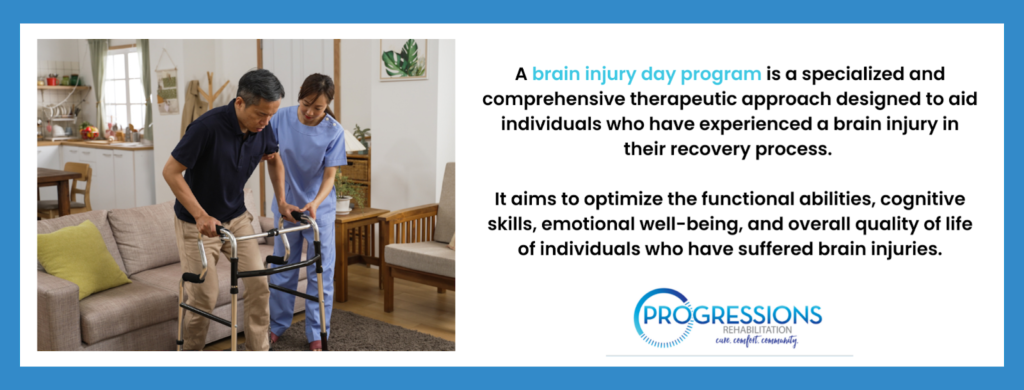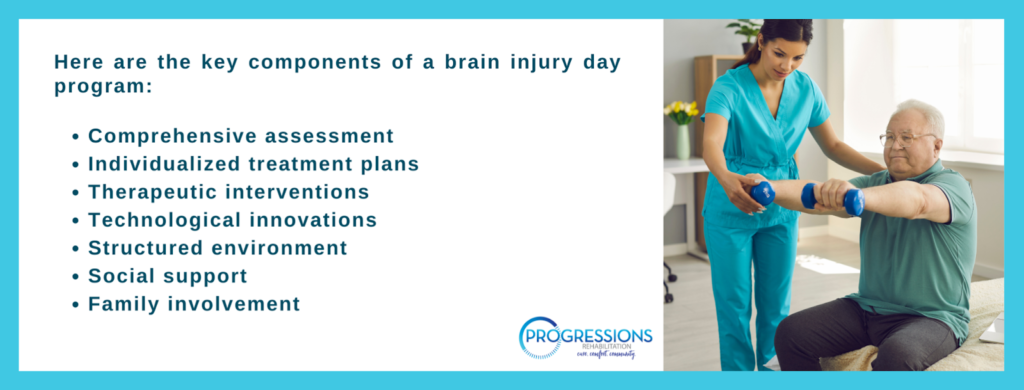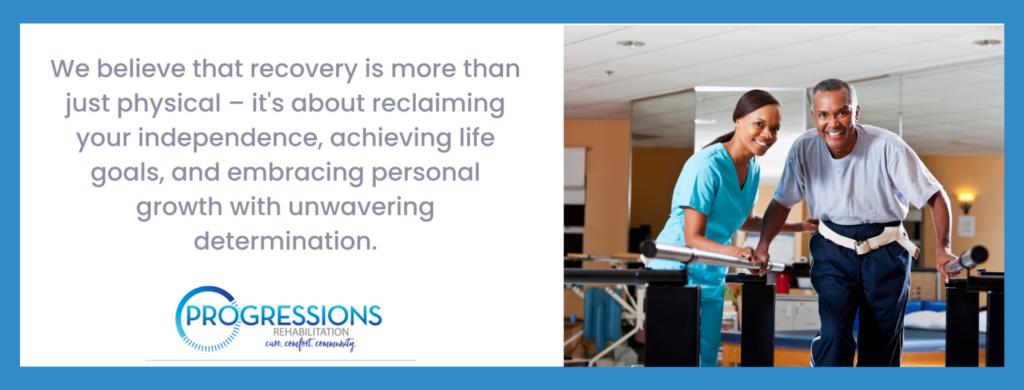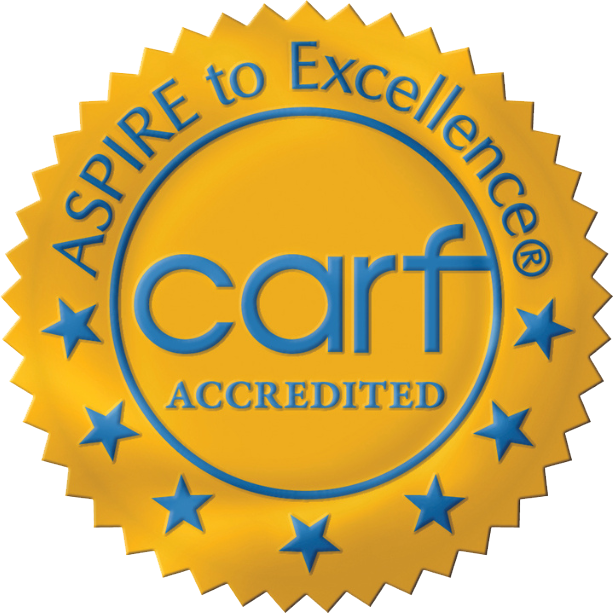Facing the aftermath of a brain injury can be an overwhelming journey, fraught with challenges that impact not only the individual but their loved ones as well.

Amidst this journey, hope shines brightly in the form of brain injury day programs. But what exactly is a day program, and how does it pave the way for remarkable recoveries? Let’s delve into this transformative experience.
What is a brain injury day program?
A brain injury day program is a specialized and comprehensive therapeutic approach designed to aid individuals who have experienced a brain injury in their recovery process.
This type of rehabilitation is typically conducted on an outpatient basis, allowing participants to receive intensive rehabilitation services during the day and return to their homes or communities in the evenings.
A brain injury day rehabilitation aims to optimize the functional abilities, cognitive skills, emotional well-being, and overall quality of life of individuals who have suffered brain injuries.
These injuries can result from various causes, including traumatic incidents such as accidents or falls, as well as non-traumatic sources like strokes, aneurysms, or other medical conditions affecting the brain.
What are the key components of brain injury day rehab?
Brain injury day program aims to empower individuals with brain injuries to regain lost abilities, develop new strategies for coping and adapting, and ultimately achieve a higher level of independence and quality of life. Its key components include the following:
- Comprehensive assessment
Each participant undergoes a thorough evaluation by a multidisciplinary team of healthcare professionals. This assessment helps determine the individual’s specific needs, challenges, and goals.
- Individualized treatment plans
A tailored rehabilitation plan is developed based on the assessment. This plan addresses cognitive, physical, and emotional aspects of recovery, focusing on areas such as memory, attention, motor skills, speech, and emotional regulation.
- Therapeutic interventions
Participants engage in a variety of evidence-based therapies. These are often conducted in both groups and one-on-one settings. Some examples include:
- Cognitive therapy
- Physical therapy
- Occupational therapy
- Speech therapy
- Psychological counseling
- Technological innovations
Many brain injury rehabilitation programs incorporate cutting-edge technologies to enhance rehabilitation outcomes. Virtual reality, neurofeedback, and assistive devices are examples of tools used to facilitate progress.
- Structured environment
The program provides a structured and supportive environment that encourages active participation and collaboration. Regular feedback and progress assessments help fine-tune the treatment plan as needed.
- Social support and community integration
Patients can interact with peers who are also on the journey to recovery, fostering a sense of community and shared understanding.

Additionally, the program may offer strategies to help individuals reintegrate into their communities and regain independence in daily life.
- Family involvement
Family members often play a crucial role in the recovery process. Brain Injury Day Programs may offer education, training, and support for families and loved ones. This way, they can better understand the challenges patients are facing and learn effective ways to provide assistance.
- Transition planning
As participants progress, the program may assist in creating a transition plan for the next phase of their recovery journey, which could include continued outpatient therapy, community resources, or recommendations for ongoing support.
Who can benefit from a day rehab?
Brain injury day rehab can benefit a wide range of individuals who have experienced brain injuries, regardless of the cause or severity of the injury.
This specialized program is designed to address the unique needs and challenges that arise from brain injuries, offering tailored interventions to promote recovery and enhance the overall quality of life. It can benefit people with
- Traumatic brain injury
- Stroke
- Brain aneurysm
- Brain tumor
- Concussion or mild TBI
- Other types of acquired brain injury
It’s important to note that the eligibility and suitability for a brain injury day program may vary based on individual circumstances.
A thorough assessment by a medical and rehabilitation team is typically conducted to determine the most appropriate treatment approach for each person’s unique needs and goals.
What are the benefits of a brain injury day rehab?
A day program offers a multitude of benefits for individuals who have experienced brain injuries. Some of its notable advantages include the following:
- Comprehensive and tailored treatment plans
Brain injury day rehabs create individualized treatment plans based on each participant’s specific needs, goals, and level of impairment. This personalized approach ensures that interventions are targeted and effective.
Furthermore, these programs offer a holistic approach to rehabilitation that addresses the cognitive, physical, and emotional aspects of recovery. This comprehensive care helps individuals regain a sense of normalcy and overall well-being.
- Functional improvement
This type of rehabilitation program focuses on enhancing functional abilities necessary for daily living. Participants work on mobility, self-care, communication, and problem-solving skills, leading to increased independence.
- Emotional and psychological support
Brain injuries can often lead to emotional challenges such as anxiety, depression, and frustration. Day programs provide counseling and coping strategies to address these emotional issues and promote emotional well-being.
- Neuroplasticity enhancement
Through consistent and structured therapeutic interventions, day programs harness the brain’s neuroplasticity – its ability to rewire and adapt – to facilitate recovery and skill reacquisition.
- Social interaction
Participants engage with peers facing similar challenges, fostering a supportive community. This interaction helps combat feelings of isolation and provides a sense of belonging.
- Family and caregiver involvement
These programs often include education and support for family members and caregivers, helping them better understand the challenges their loved one is facing and how to provide effective assistance.
- Flexibility and autonomy
Patients have the freedom to return to their homes or communities after therapy sessions, offering a level of autonomy and comfort. Unlike in a traditional setting wherein patients may have limited personal choices and flexibility in their daily routines.
- Improved quality of life
Ultimately, the culmination of these benefits results in an improved quality of life. Patients experience greater independence, confidence, and a higher overall level of functioning.
Experience Life’s New Horizons with Progressions Rehabilitation

At Progressions Rehabilitation, we are not just a rehabilitation center – we are your partners in conquering challenges and unlocking the boundless potential within you.
As a full-service provider dedicated to individuals with brain and spinal cord injuries, we are here to help you redefine possibilities, celebrate achievements, and embrace personal growth. Some of the services and programs we offer include:
- Group homes for brain injury patients
- Assisted living for brain injury
- Neuro rehabilitation
- Group homes for spinal cord injury
- And more!
We believe that recovery is more than just physical – it’s about reclaiming your independence, achieving life goals, and embracing personal growth with unwavering determination.
Contact us now to learn more.
The material contained on this site is for informational purposes only and DOES NOT CONSTITUTE THE PROVIDING OF MEDICAL ADVICE, and is not intended to be a substitute for independent professional medical judgment, advice, diagnosis, or treatment. Always seek the advice of your physician or other qualified healthcare providers with any questions or concerns you may have regarding your health.



